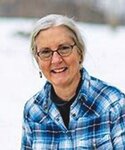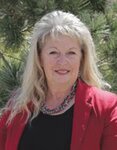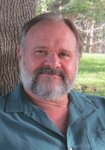Mike Maltais, Staff writer
OKANOGAN – Ballots for the Nov. 4 general election went into the mail to voters last week and two county races many will be watching are the contests for Okanogan County Commissioner, District 1, between incumbent Chris Branch and his Republican opponent Shauna Beeman, and District 2 between Republican incumbent Andy Hover and his Democratic challenger Katie Haven.
Hover v. Haven
The results from the August primary election found Haven with a narrow half-percentage-point lead over Hover heading into the Nov. 3 general. The COVID-19 pandemic was a leading issue for primary voters, and it was joined by the August and September wildfires that factor into the upcoming vote.
Andy Hover
When asked what is new on voters’ minds since the primary, Hover was quick to cite the latest disaster.
“One big change has been the fires,” said Hover. “We had lots of cattle ranches this time around; lots of cattle lost, lots of fencing, lots of structures.”
Hover said he refers to after-action reports to clarify where mistakes were made and what can be done to better prepare for the next fire.
“We’re trying to get that dialed in better so we can better serve our residents n the next one,” said Hover. “We had our electrical backbone that went down and with the outages that resulted we have to do a better job of hardening structures to fire.”
Earlier this month the Okanogan PUD announced that it will issue up to $40 million in bonds and some of that money will be used to replace wooden poles with steel when rebuilding the Okanogan to Brewster transmission line that was damaged in the Cold Springs fire.
Hover also underscored the timeliness of the emergency communications tax that was passed by voters last year and took effect April 1 this year.
“We could not get emergency communications past Tonasket for dispatch during the fire,” said Hover. “We actually had to bring in LifeLine and use their system. That’s why we need the tax to bolster that system.”
Hover observed that while the DNR has improved forest management practices on its land, “we do have a lot of forested land that is going to suffer the same wildfire fate if we can not get the Forest Service moving faster on things.”
Hover pointed to the commissioners’ involvement in the North Central Washington Forest Health Collaborative’s Mission Restoration Project as a critical component of improving forest health.
“All those people together agreed that the Mission Project is a good project,” said Hover. “I think some environmental groups around here are seeing that we can perform good practices,”
Hover noted that Okanogan Public Health now has the resources it needs thanks in part of more than $500,000 the county allocated of the $800,000-plus OPH received in CARES Act funds.
“We also allocated more than $600,000 in grant money to the economic development district,” Hover added.
Hover said that among his goals for a second term include:
● Maintaining the fiscal responsibility of the last four years. Hover saved the county more than $200,000 in legal fees when he assumed the role of labor contract negotiator for the county during his first term.
● Moving forward on water and land use issues.
● Keeping the level of service.
Katie Haven
QCH: When we last spoke before the primary you said that in addition to having to reinvent your plan, you heard from voters that the coronavirus pandemic had emerged as the leading issue in the county. It has been four months. What are you seeing now as your primary and secondary issues that will fire up voters in your contest?
The pandemic continues to be a concern, but it is now regarded as more of an overarching issue that is on-going. I’ve spent the last few months calling voters and walking through the neighborhoods of all the major towns in our county and I’m hearing a common theme. People are saying that they are frustrated about the lack of information from the county in general and would like more outreach and easier access for participating in decisions at the local level. Wildfire protection and prevention has also understandably been on people’s minds. This encompasses a broad range of issues involving how we manage our resources and plan for growth, which impact our ability to be resilient to the more frequent extreme events that are predicted.
QCH: Since this is not and has never been a wealthy county many of your constituents are struggling to keep businesses afloat while they await either permission to reopen or get another lifeline. What do they want you to do for their cause if your win the commissioner’s seat?
I think that people just want this pandemic to be over and are hoping that we can start opening up our businesses and schools. But they also want to do it safely without putting their families and neighbors at risk. That means that we need to pull together as a county and follow the recommendations of the medical professionals who are learning more and more about what is effective in preventing the spread and encouraging us all to do the simple things that will accomplish that. People look to their leaders for direction and reassurance that they are doing the right thing. They want their elected officials to model the behavior that they are asking others to do. And they want to be kept informed. An effective leader will motivate a group to work together to achieve a goal – in this case it’s keeping the virus under control so that we can move towards resuming our normal lives. That is what people want and what I will endeavor to do once I’m elected
QCH: Are you satisfied with what the SBA has done for the county so far? Is the PPP and EIDL still helping? If this pandemic is still hanging around after Jan. 1, what will be among your first actions?
I think that the loans and grants that the SBA provided did help our county a lot. According to the information that was released earlier this year there were over $53 million in PPP payments alone that went to 634 businesses in our county. That represents over 6300 jobs that were saved. That is significant. In addition, most people got a $1200 payment that many of them spent locally, which also helps. I think that we are still seeing the benefits of that boost and many businesses have figured out how to adjust their operations to stay open. Once elected I will stay on top of all opportunities for businesses and individuals to access any future funding that is made available and make sure the county is a resource for accurate information. I will work to ensure that people have access to the help they need.
QCH: Are you finding a growing landlord/renter crisis on top of the already existing affordable housing shortage? What is your plan to see more affordable housing projects in the county?
Affordable housing has been an issue for a while now, and the pandemic has complicated the situation. In parts of our county many homes are not available for long term rental because it is more profitable to rent them to short-term visitors. The pandemic seems to have initiated a real estate boom in all parts of the county – people from urban areas such as Seattle or Spokane who can work from home are moving here permanently. They can afford to pay more, which drives the cost up. There is no easy answer, but the first step is to acknowledge that there is a problem and then bring our communities together to look for solutions. We all have an interest in making sure that our hospitals, schools, and other employers can hire the best people, which depends partly on making sure that there is housing to accommodate them. It’s part of the bigger picture of having a solid plan for growth, which should address housing needs in addition to other things.
QCH: With Mr. Culp as the main contender opposing the governor and you running as a Democrat, where do you disagree with him with respect to what path the county or businesses should follow during the pandemic?
I believe that when it comes to public health, we should continue to follow the methods that have been established and used for decades. Our Public Health department is not doing anything differently now that it has done in the past. Elected officials are entrusted with ensuring the safety and well-being of everyone in their jurisdiction and they are expected to use all the tools at their disposal to do so. Issuing proclamations and directives are some of those tools. When there is verified data and evidence that taking certain steps will save lives, it is the duty of our elected leaders to take action. When the evidence shows that doing a simple thing like wearing a mask is highly effective, our leaders should do whatever it takes to get people to do so. Asking for voluntary compliance is good, but if it’s not getting results then stronger steps must be taken. Asking businesses to make sacrifices is hard and should not be done lightly, but again, if it will ensure the safety of all our residents, it is the right thing to do. I have had feedback from people who say that it is actually easier on everyone if there are mandatory rules – it takes pressure off having to make a tough decision or justify your actions. In general, we are a society that supports and follows safety rules– we wear our seatbelts, we don’t tolerate drunk driving, we refrain from smoking in public places, etc. Taking steps that will protect ourselves and others from a potentially deadly disease should be no different.
QCH: What other issues have come to your attention during the last four months?
One question I hear a lot is “what have we accomplished in the past 4 years?” There is a general sense that our county could do a lot better on building relationships with our partners at the state and in seeking out opportunities to fund projects that will benefit our residents. These opportunities rarely just fall into our lap – we have to go out and find them. Another concern I’m hearing is that our Community Wildfire Protection Plan is out of date and hasn’t been updated as required. That plan contains a list of projects that could help us build resilience to fires and protect people’s lives and property but most of them have not been implemented. I am hearing from folks that they would like to see us do much better in that area. We need to do everything we can to qualify for the funding that will help us accomplish that, and make sure that we don’t miss deadlines for applying.
Branch v. Beeman
Incumbent Chris Branch rides a comfortable primary margin into the general election as he seeks a second term in the face of his well-known Democratic opponent Shauna Beeman.
Shauna Beeman
QCH: As a rancher you must have some firm ideas about water rights and access to crop water. In the backwash of the HIRST decision of 2016 and the threat it posed to rural water access, do you propose a strategy or action(s) to strengthen private water rights in the county?
Okanogan County is very diverse in its communities, crops, and environment. We range from high mountains to more arid land. We need to get a new Comprehensive Resource Plan in place. This plan would clearly address water and land usage throughout our county. It need not be filled with pages of government regulation. A simple well-thought-out sustainable plan that addresses and protects environmental concerns while meeting human needs. Cooperatively we can protect and preserve the beauty, heritage, and diversity of our county for future generations while still allowing for growth, crop needs and development.
QCH: As a rancher what do you propose to promote multi-use of public lands for such activities as livestock grazing or other rural needs that might encounter opposition from conservation groups?
Yes, I do promote multi-use of public lands. It is proven that grazing helps to reduce the fuels that increase fire danger. Outdoor activities are what attract people to our county and those activities, in one form or another, are what most of our residents enjoy about the county. By being considerate of each other and by being good stewards, public lands can be successfully used by everyone.
QCH: You support the North Central Washington Narcotics Task Force. Do you think the NCWNTF is of adequate size and strength to meet the needs of a growing county? If now, what would you propose to enhance it?
We need to strengthen our ability to help those with addictions and mental health issues by developing more accessible and affordable programs that use a more long term approach. The drug task force is one area I am passionate about strengthening. If we sharpen our focus on substance abuse it would strengthen our community by helping our kids avoid substance related issues. Less drug related issues will lead to less crime and make our communities a safer place.
QCH: What would you do to address more adequate and affordable housing?
A starting point for me would be to reach out to companies and businesses and attract them to our county. This would help to bring in Living Wage Jobs. Low paying jobs make it difficult for people to pay rent. We need this job development in our country while still being mindful of and protecting our natural resources.
Chris Branch
QCH: You have expressed concerns about unfunded federal and state mandates that place extra burdens on the county. Have there been one or two that stand out for you?
A recent example would be the requirement set forth in SB 5472 which required County Auditors to increase the number of ballot drop boxes. Washington State Association of Counties (WSAC) and I as a County Commissioner fully support more convenient access for voters. Our County Auditor supports voter accessibility as well and went to work immediately to implement the law. However, according to the State Constitution, counties are extensions of state government, so we continue to remind the Legislature that we need compensation for the impacts of laws that result in fiscal impacts. The estimated capital costs statewide were over one million dollars annually in operating and maintenance costs which includes two employees traveling to each of these boxes to retrieve the ballots. Some Counties filed claims and WSAC of which I am a board member and member of the Legislative Steering Committee filed suit pursuant to RCW 43.135.060 which prohibits such mandates without funding. WSAC recently prevailed in this case and the Court ordered payment to those counties that had filed claims for the cost.
Other examples of unfunded or underfunded services include indigent defense, public health services and inmate medical care. These are services that the County is mandated to provide but are significantly underfunded.
QCH: What are your feelings about WDFW’s policy of purchasing private lands and is PILT (Payment In Lieu of Taxes) comparable to individual property taxes.
In regard to the policy to purchase private lands it is important to recognize that such purchases are made to ensure that there is adequate public land for public access and ample habitat to maintain the fish and wildlife resource that so many of our residents and visitors expect. WDFW owned properties provide not only local but important statewide conservation and recreation opportunities that result in business and revenue the County may not otherwise experience in the local economy. Large parcels of land may otherwise be developed that often result in an increase in cost of services provided by the County. Since I have been in office, we have engaged in respectful discussions with WDFW to consider the pros and cons of acquisition proposals. The last three that we supported were properties that made perfect sense to be in public ownership.
If paid at the appropriate value I consider the PILT as reasonable compensation for removing these public properties from the tax roll. However, in their efforts to control spending, the state Legislature, in 2018 and years prior, capped the payment of PILT at a level that results in nearly half of the revenue that we might receive otherwise. I have been involved at the legislative level to support a proposal by WDFW to standardize the method of calculating PILT at a level comparable to open space assessments. In Okanogan County the payments are capped at about $264,000 when the full calculation is estimated at $552,000.
QCH: Was it at your - or the commissioners’ - directive that the landfill fees be temporarily waived for fire debris dumping?
Such a directive requires consideration of the entire board and not just one commissioner. However, I prepared the resolution that waived the tipping fee for those whose homes were destroyed in the Palmer and Cold Springs Fires. In certain circumstances I prepare resolutions for consideration of the board, aided by my many years of experience developing resolutions and ordinances.
QCH: Other comments?
In my years of working in the timber industry I experienced fire in the forests of Okanogan County but times have changed where wildland fires that affect life and property are becoming more prevalent across the West which is genuinely concerning in my role as a Commissioner. I am proud of the people of this County who show such resilience in responding to community disaster. Government simply can’t do everything but our role in immediate emergency response is critical to ensure that our people are stabilized and on the road to recovery.
I was involved in helping protect homes at the start of the fire and attended meetings with victims and those responding to their needs. County Emergency Management and other County departments worked well with the Colville Tribes and volunteer recovery groups in addressing those immediate needs. My personal policy is to provide support to all our departments in performing their duties and to avoid micro-managing situations where those with the expertise should be in charge. We always find room for improvement and I am in office to both lead and support that effort to be the best that we can be.




Comments
No comments on this item Please log in to comment by clicking here